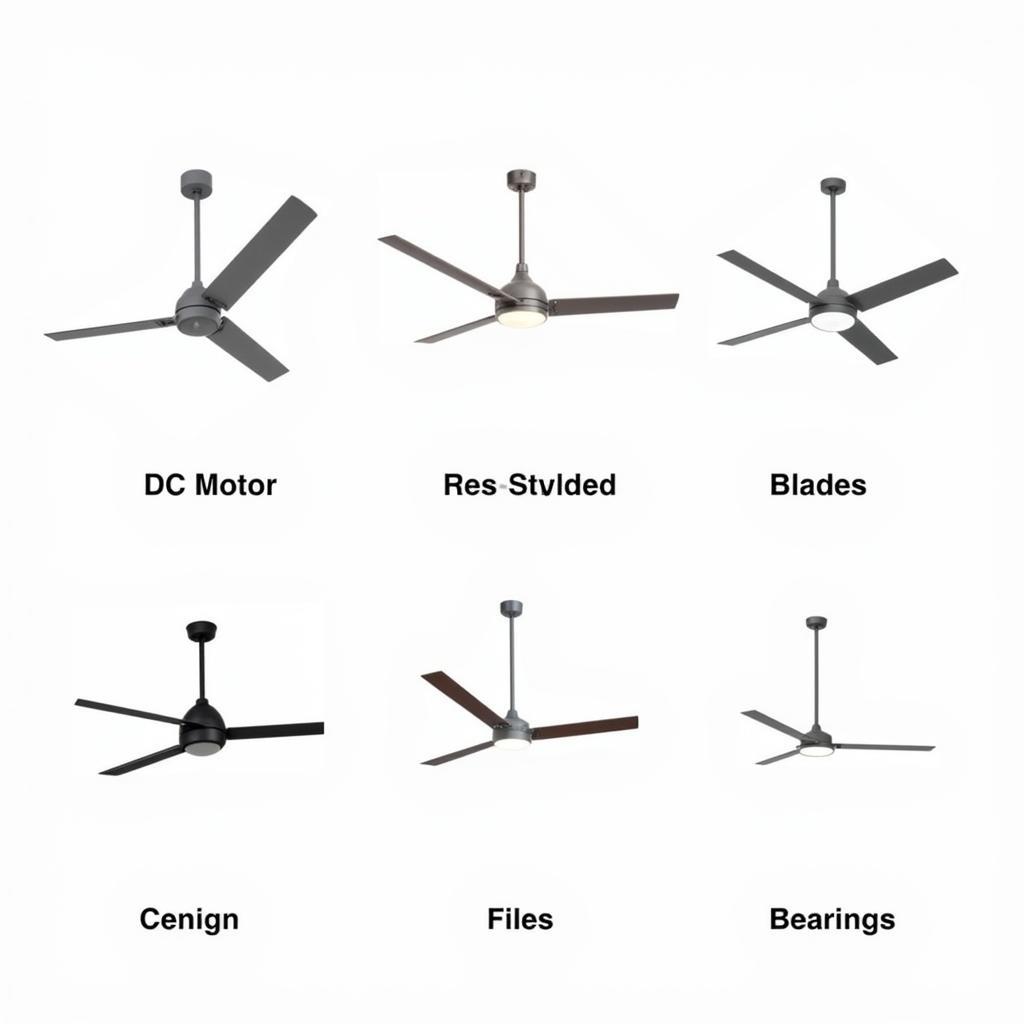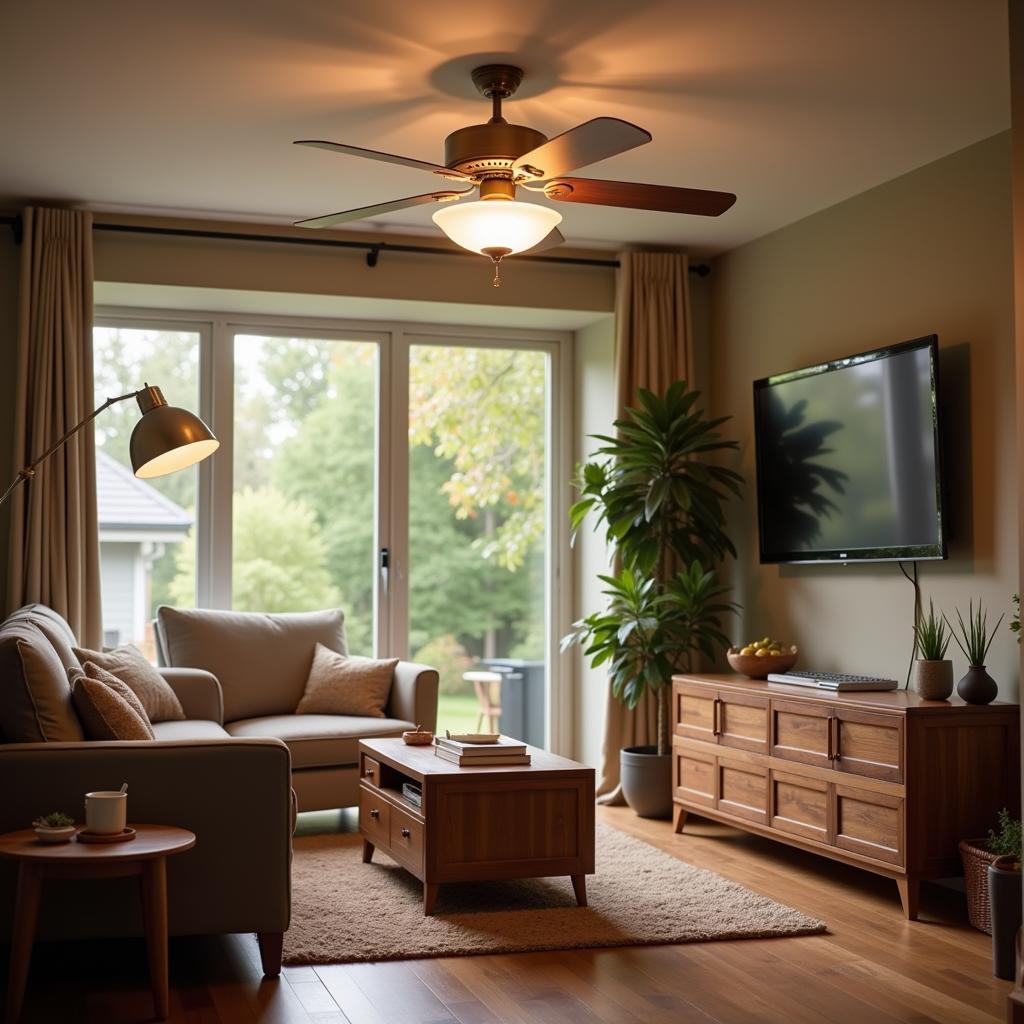Ceiling Fan Noise can disrupt sleep, concentration, and overall peace in your home. Understanding the causes and solutions to this common problem can significantly improve your quality of life. This guide explores everything you need to know about minimizing ceiling fan noise, from identifying the source to implementing effective solutions.
Why is My Ceiling Fan So Noisy?
Several factors contribute to a noisy ceiling fan. Loose screws, worn-out bearings, blade imbalances, and even dust buildup can all create unwanted sounds. Identifying the specific culprit is the first step towards a quieter environment. Are you constantly battling the whirring and clicking of your fan? Let’s dive into the most common causes.
-
Loose screws: Over time, the vibrations of the fan can loosen screws in the motor housing, blade irons, or other components. This often results in a rattling or clicking sound.
-
Worn bearings: The bearings within the motor allow the fan to rotate smoothly. As they wear down, they can produce a grinding or humming noise, especially noticeable at higher speeds.
-
Blade imbalances: Uneven weight distribution across the fan blades can cause wobbling and a whooshing or humming sound. This can happen if the blades are warped, bent, or have accumulated excessive dust.
-
Dust accumulation: A thick layer of dust on the fan blades not only reduces efficiency but can also add to the noise level. The added weight can exacerbate imbalances, leading to increased wobbling and noise.
For those looking for a quieter cooling solution for their bed, a bed fan cooling system might be a worthwhile consideration. Check out our article on bed fan cooling system.
Troubleshooting and Solutions for Ceiling Fan Noise
Once you’ve identified the likely cause of the noise, you can take steps to address it. Often, simple solutions like tightening screws or cleaning the blades can make a world of difference.
Tightening Loose Screws
Carefully inspect the fan for loose screws, paying close attention to the motor housing, blade irons, and any other connections. Tighten any loose screws you find using the appropriate screwdriver. This is often the easiest and most effective fix for rattling noises.
Balancing the Blades
If you suspect blade imbalance, try cleaning the blades thoroughly to remove any accumulated dust. If the noise persists, you can purchase a balancing kit to help even out the weight distribution. These kits usually involve small weights that you attach to the blades until the fan rotates smoothly.
Lubricating the Motor
If the noise seems to be coming from the motor, lubricating the bearings can often help. Consult your fan’s manual for specific instructions on how to lubricate the motor safely and effectively.
Replacing Worn Parts
In some cases, worn-out parts like bearings may need replacement. You can often find replacement parts online or at your local hardware store. If you’re not comfortable working with electrical components, it’s best to consult a qualified electrician.
Proper bathroom ventilation is crucial for removing excess moisture and preventing mold growth. If you’re looking to upgrade your bathroom ventilation, you might find our article on bathroom exhaust fan installation helpful.
Choosing a Quiet Ceiling Fan
If you’re in the market for a new ceiling fan, consider factors that contribute to quiet operation. Look for fans with DC motors, which are generally quieter and more energy-efficient than traditional AC motors. Also, check for features like balanced blades and well-lubricated bearings.
When to Call a Professional
While many ceiling fan noise issues can be resolved with DIY solutions, some situations may require professional assistance. If you’re uncomfortable working with electrical components, or if the problem persists after attempting basic troubleshooting, it’s best to call a qualified electrician.
For those sensitive to noise while sleeping, finding the right fan sound can be crucial. You might find our article on fan noise for sleeping helpful.
 Choosing a Quiet Ceiling Fan: Look for DC motors, balanced blades, and well-lubricated bearings for optimal quiet operation.
Choosing a Quiet Ceiling Fan: Look for DC motors, balanced blades, and well-lubricated bearings for optimal quiet operation.
“A well-maintained ceiling fan can last for years with minimal noise,” says John Smith, a certified electrician with 20 years of experience. “Regular cleaning and lubrication are key to preventing noise issues.”
Conclusion
Ceiling fan noise can be a frustrating problem, but with a little troubleshooting, you can often restore peace and quiet to your home. By addressing the root cause of the noise, whether it’s loose screws, unbalanced blades, or worn bearings, you can enjoy the cooling comfort of your ceiling fan without the unwanted noise. Remember, regular maintenance can significantly extend the life of your ceiling fan and minimize noise issues. Ceiling fan noise doesn’t have to be a constant companion.
 Enjoying a Quiet Ceiling Fan: A peaceful room with a silently operating ceiling fan.
Enjoying a Quiet Ceiling Fan: A peaceful room with a silently operating ceiling fan.
Improving indoor air quality is essential for health and well-being. If you’re interested in bringing fresh, filtered air into your home, take a look at our article on a fresh air fan with filter. Additionally, for efficient and discreet ventilation, consider an in line extractor fan, which we discuss in detail on our website.
“Investing in a high-quality, quiet ceiling fan can save you money on energy bills and reduce noise pollution in your home,” adds Jane Doe, an HVAC specialist with over 15 years in the industry. “It’s a worthwhile investment for long-term comfort and peace of mind.”
FAQ
-
Why is my ceiling fan making a clicking noise? This is often caused by loose screws.
-
How do I balance my ceiling fan blades? Use a balancing kit or clean the blades.
-
Can I lubricate my ceiling fan motor myself? Yes, consult your fan’s manual.
-
What is a DC motor ceiling fan? A quieter and more energy-efficient type of fan.
-
When should I call an electrician for ceiling fan noise? If you’re uncomfortable working with electrical components or DIY solutions don’t work.
For any assistance, please contact us at Phone Number: 0903426737, Email: fansbongda@gmail.com or visit us at Address: Lot 9, Zone 6, Gieng Day Ward, Ha Long City, Gieng Day, Ha Long, Quang Ninh, Vietnam. We have a 24/7 customer service team.


